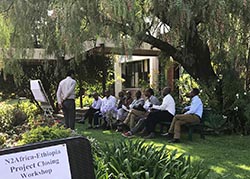The N2Africa project organised two workshops with participants from government, private sector, research and NGO, to discuss policy recommendations for government and development partners for further support to the development of the legume sector. A first round of policy analysis interviews were held in December 2018. Policy recommendation workshops were held in Addis Ababa, Ethiopia, on 3 May and in Iringa, Tanzania, on 8 May.
As the project is coming to an end mid-2019, N2Africa organised a policy advocacy activity in Ethiopia and Tanzania. Policy recommendations would encourage government and development partners to bring N2Africa results further by paying more attention to the economic, environmental and nutritional potential of the legume sector, while addressing some of the constraints experienced along the value chain, and in the organisation of the sector as a whole.
In December 2018, Ferko Bodnar, part time at the Dutch Ministry of Foreign Affairs and part time consultant, held 15 interviews in Tanzania, together with Freddy Baijukya and Mwantumu Omari (IITA), and 20 interviews in Ethiopia, together with Endalkachew Woldemeskel (IRLI), following the legume value chain in these two countries. Based on these interviews, and on N2Africa evidence on the economic, environmental and nutritional benefits, draft policy recommendations were presented and discussed in two half-day policy workshops. The workshops allowed the validation and adaptation of the draft recommendations, and, in Tanzania, also a planning of who could play what role in bringing these recommendations further to policy makers.
| What was encouraging in Ethiopia, was that - even though recommendations plead for a more modest and facilitating role by government, giving more room for private sector and farmer organisations - there are already very creative and vocal enterprises and farmer cooperative unions active in seed production, input distribution, processing and export. They contributed to the lively working group sessions, while a Ministry of Agriculture representative invited private sector to come up with more suggestions for policy improvements. |  |
In Tanzania, working groups were invited to also come up with a plan, of who could bring what policy recommendations under the attention to policy makers. A key role is foreseen for the Southern Agricultural Growth Corridor of Tanzania (SAGCOT), who could host the secretariat for a legume and soya platform that bring together government, private sector, farmer organisations and development partners, for policy dialogue, a better information flow, and organisation of the sector (see below).
The final policy recommendation reports will be available soon.
Ferko Bodnar, Independent Consultant
